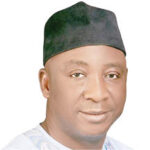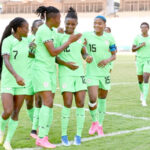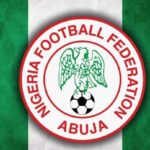By Oladipo Sanusi
The story of Nigeria’s maiden World Cup appearance in the United States in 1994 is very interesting. Nigeria’s Head of State, General Sani Abacha, was feeling the heat from pro-democracy groups, civil society organisations, critics, and unrelenting clamour for a return to a democratic presidency all being the aftermath of the annulment of the June 12 1993 presidential election results.
The General looked for a think tank that could lessen the tension in the polity and was promptly alerted by his advisers that an appearance in the USA 94 World Cup could bring intermittent relief to a beleaguered government.
- 2023: I’ll beat Tinubu, Amaechi, Okorocha at APC presidential primary – Yahaya Bello
- 2023: I’ll beat Tinubu, Amaechi, Okorocha at APC presidential primary – Yahaya Bello
Of course, nobody arrives at the World Cup by flashing a set of beautiful dentures: you must navigate excruciating qualifiers involving travels, protocols, and heavy expenses. Abacha was ready for all that. Moreover, the Eagles being involved with qualifiers would occasionally divert the attention of Nigerians from the military over-lordship and clamour for democratic governance and a lot of noises would be made in the media in the build-up to the matches. and post-match reactions in the series.
Then how did Abacha do it?
He raised a committee involving the late Patrick Okpomo, then the Secretary-General, Nigeria Football Association (NFA), and the late Alex Akinyele, then Chairman, National Sports Commission (NSC), to ensure that Nigeria’s World Cup dream was realised.
The committee travelled to Zurich, headquarters of the Federation of International Football Association (FIFA), and met the generalissimo, the late Joao Havelange. Havelange reportedly joked that the Nigerian contingent was indeed late in visiting.
“I handed over a FIFA World Cup to you in 1985 (Nigeria having won the years FIFA U-17 World Cup). Now, you are just visiting,” the late Alex Akinyele revealed to this writer part of what transpired at the meeting.
Havelange went into what appeared to be a trance and after returning asked his secretary for a piece of paper in which he wrote: Amos Adamu, Zungeru, Nigeria, Akinyele recalled.
While Akinyele was confused, the late Okpomo, being an inner caucus in FIFA, got the message: Nigeria had to look for Amos Adamu, who would pave the way to the USA 94 World Cup.
On the orders of Abacha, Amos Adamu was produced from his academic duties in Zungeru, northern Nigeria, and driven straight to Aso Rock to interface with Abacha.
Adamu, then unknown in sports circles, told Abacha emphatically that he would run a sole administrator office to get the job done the way he felt it should be. Rather than relating with the politicians, he would rather maintain a network of academic professionals with whom he had long-standing trust and understanding. This was how the likes of Bolaji Ojo-Oba and Tijani Yusuf came into the picture in the soap opera of the qualifiers of the USA 94 World Cup.
Talent is not enough for boardroom politics. With the great talents in stock for Nigeria starring the late Stephen Keshi, late Rashidi Yekini, Dan Amokachi, Emmanuel Amuneke, and George Finidi, among others, the Eagles were armed and reinforced for the trip to the United States. Then came a big hurdle in the Ivorien football chief and stalwart, Simplice Zouzou, the President of Africa Sport Sporting Club of Abidjan, who was equally connected with FIFA and also scheming for the flag of the Ivory Coast to be hoisted at the 1994 World Cup.
Then the target – the Fennecs of Algeria. If the Algerians beat Nigeria, Ivory Coast would coast to the World Cup. A draw was enough for the Super Eagles and the attention of football-loving Nigerians was on Annaba in Algeria. Fortunately, Nigeria got a hard-fought 1-1 draw at Annaba and the Eagles flew to the World Cup.
Boardroom politics is part of football’s gamesmanship. It is allowed and Nigeria played it well on the road to USA 94 World Cup. On getting to the World Cup, Nigeria made its impact, exporting an attractive brand of attacking football where all the forwards – Rashidi Yekini, Samson Siasia, Daniel Amokachi, Emmanuel Amunike, George Finidi – scored. FIFA named Nigeria the Jolly Green Fellows following the spectacles displayed by the country’s Supporters Club on the stands, singing, drumming, and dancing to the beat of the game. FIFA loved Nigeria since then.
World Cup disappointment is unforgivable. Nigerians are still smarting from the disappointment of missing out on the forthcoming World Cup in Qatar. The Nigerian Football Federation promptly announced the sack of the technical crew in the aftermath.
However, from the USA 94 example, going to the World Cup transcends the suitability or otherwise of the technical crew or the playing personnel. How well has the Federation played its cards? Is the house of football in order? Luckily for the Federation, the Federal Government of Nigeria does not appear to have a robust interest in football matters. Otherwise, the Federation should be the first squad to be fired soon after the disappointing home draw with Ghana in Abuja on March 29.
A country’s boardroom politics is as strong as the influence the country wields in FIFA. No doubt, the cluelessness of NFF contributed in no small way to the Eagles failure to secure a 2022 World Cup berth. The failure had its roots in the sacking of German Gernot Rohr. Granted that Rohr was not giving Nigerians the performance they wanted, he gave them the results they needed and the German trainer wondered how bold the NFF was sacking him while still owing him. Rohr, in the second term of his contract, qualified the Eagles for the Nations Cup and the playoff of the World Cup qualifiers.
No lesson learnt. Popular opinion was not on the side of Rohr when he was booted out but must the Federation dance to the tune of the people? Rohr was unpopular then. Now the Federation is hated more not just for axing Rohr but for failing to take Nigeria to the Coupe de Mundial.
Barely weeks to the Nations Cup, the NFF sacked Rohr. In his stead, Austin Eguavoen was drafted from his position as head of the Technical Department to play the role of the interim coach at Cameroon 2021.
Meanwhile, the NFF had informed the public of the intention of hiring Jose Peseiro after the Nations Cup. The coach was expected in Cameroon to watch the Eagles from the stands as an observer.
Nigeria travelled this lane before and it backfired at the 2010 African Cup of Nations in Angola. Nigeria, at that time, had the late Shuaibu Amodu as head of the Super Eagles technical crew but the Football Federation had the plans of hiring French coach, Herve Reinhard, who incidentally led Zambia to the championship, as the foreign coach to lead the Eagles to the 2010 World Cup in South Africa.
The rumour of impending employment of Reinhard, whose team Nigeria had dispatched in the quarterfinal of Angola 2010 AFCON, unsettled the Eagles in the championships semi-final clash against Ghana and the Eagles eventually lost the game 0-1.
Meanwhile, Peseiro never set his foot in Cameroon, telling the media in Portugal, his home country, that the NFF had no clear-cut plans for him on the job. Interim Eguavoen and his Eagles were ousted from the Nations Cup in Cameroon in the second round.
This in itself is a dent on the dignity of the country and the NFF is yet to deem it fit to either apologise to Nigerians or explain in detail how Peseiro, introduced as Nigeria’s prospective coach, disappeared on the radar of consideration.
There is the honourable way out. On 24 July 2016 and 16 September 2021, FIFA President, Giovanni Infantino was a guest to the Nigerian government to give an impression that the country was already reaping the reward of having the NFF President, Amaju Pinnick as a FIFA Council member.
However, after the two visits by Infantino, the country is yet to benefit either physically through new developmental programmes or goodwill to appear at the World Cup. This is where Pinnick failed Nigerians. He saw Ghana snatch the World Cup ticket from the jaw of Nigeria right in front of the Abuja crowd, and the honourable thing is for him to go.
The first time out, Abacha’s committee visited FIFA in Zurich and the result saw Eagles fly to the USA 94 World Cup; the ticket was obtained in Annaba, Algeria. This time around, FIFA’s President, Infantino, came to Abuja twice and the World Cup ticket was lost in Abuja at the final moment.
If Pinnick has tried, his effort is not good enough for Nigeria. He has failed to make his presence in FIFA count. The odious thing is that as a FIFA Council member, he will be in Qatar for the World Cup while the country that sponsored him for the slot, Nigeria, will not.
If he knows what honour is, like his Algerian counterpart did, Pinnick should not wait until Nigerians start to remind him of the allegations surrounding the $8.4 million paid by FIFA to NFF for appearance fee at the 2014 World Cup in Brazil, before he resigns.
Sanusi is an Abuja-based media practitioner
 Join Daily Trust WhatsApp Community For Quick Access To News and Happenings Around You.
Join Daily Trust WhatsApp Community For Quick Access To News and Happenings Around You.


